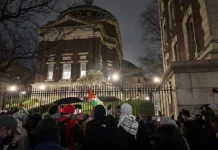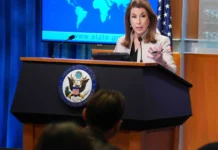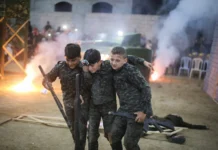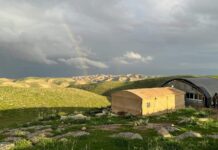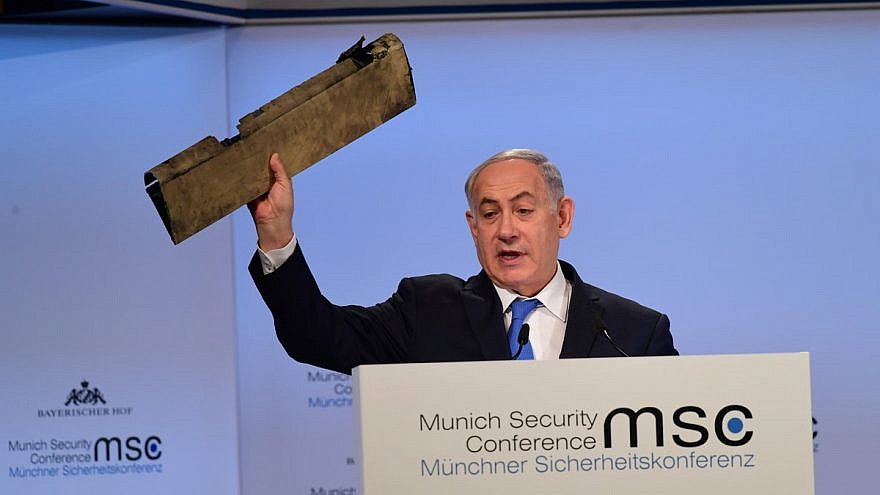Israel’s covert war with Iran became overt when, in what can only be interpreted as a clear escalation, Iran sent an armed drone into Israeli territory in February. While Israel then wiped out most of Syria’s air defenses after an Israel Air Force fighter jet was shot down, now, after Israel allegedly struck the T-4 base in Syria—killing several Iranian personnel—Iran is threatening to retaliate.
The issue is when, where and how.
According to David Makovsky, director of the Project on the Middle East Peace Process at the Washington Institute for Near East Policy, “There is no question that there is more uncertainty of a possible war between Israel and Iran or its proxies then there has been in the past,” he told JNS.
Israel would prefer to see the international community take a larger role in preventing Iran from becoming even further established in Syria, but this is unlikely since, as he explained, “the American strategy in Syria is largely focused on ISIS.”
Makovsky acknowledged that “all this is not great comfort for Israel, which would like to see America launch its own military strikes.” Since this is unlikely at the moment, it is assumed that the United States would back Israel politically if it decides to take further military action against Iran in Syria.
“It doesn’t seem to me that the president, given his public statements, has an interest in expanding America’s role in Syria,” he added.
Behnam Ben Taleblu, a senior Iran analyst at the Foundation for Defense of Democracies, told JNS that “the main strategy now for Israel is managing escalation dynamics in Israel’s favor. This is because Iran will seek to test Israel again. The armed drone was a qualitatively different threat for Israel—it represents a threat against the entire population and not just a message to Israel’s political or military establishment.”
Like Makovsky, Ben Taleblu also does not see an expanded U.S. role in Syria, and at present, U.S. foreign policy there is still muddled. “Right now,” he said, “there is an unknown ‘unknown’ in terms of American analysts who are trying to define U.S. defense strategy in Syria. First is the anti-ISIS campaign. The second is more normative, and that is upholding the non-use of chemical weapons. And the third is military commanders rhetorically blaming Iran for what is taking place in Syria.”
Netanyahu: ‘Aggression against aggression’
In anticipation of Iran’s intentions to retaliate, Israeli security and defense planners are making every effort to demonstrate to Iran that Israel has superiority, and that it is not worth the consequences for Iran to try and strike Israel.
As such, Israel announced that it was reportedly canceled plans to send its warplanes to a joint military exercise with the United States in Alaska amid concerns of the Iranian buildup.
At the same time, Israeli leaders have made it clear to Iran that they will not tolerate its threats.
“Our policy can be summed up in three words: aggression against aggression,” Israeli Prime Minister Benjamin Netanyahu said last week.
However, Iranian officials have responded to Israel’s actions and rhetoric.
“Israeli aggression against the Syrians and the region’s Muslims remains ongoing,” Iranian Foreign Ministry spokesman Bahram Ghasemi said earlier this week, adding that Tehran would respond “sooner or later.”
Similarly, Hezbollah’s Deputy Secretary General Naim Qassem on Tuesday told the pan-Arab satellite TV station Al-Mayadeen that Iran would retaliate against Israel.
“We have to expect something from Iran,” he said. “Hezbollah and Iran will not allow Israel to limit their movement in Syria.”
‘Finish off last pockets of resistance’
Assaf Orion, a senior research fellow at the Institute for National Security Studies, told JNS “what we see in Syria now is an accumulation of several issues. One is the latest phase in the civil war, which means the regime feels quite emboldened to wrap up the last places of resistance. There is action up north between Turkey and the Kurds. Farther south, Russia has concentrated on Damascus and its suburbs.
“This conjunction,” he continued, “means Syria feels confident to use chemical weapons. The regime has regenerated capabilities and the resolve to use it. The chemical attack was part of the regime’s usual style to finish off last pockets of resistance.”
In 2013, Syria joined the Chemical Weapons Convention, “but it is evident that the two northernmost sites that were hit by the coalition forces were post-2013 sites,” said Orion. “So actually, the Assad regime moved their assets around, kept some if its capabilities, hid them and then, assisted by Russia, used smoke and mirrors to deny their existence. The coalition strike was meant to tell Syria that the international community knows it used chemical weapons. But it all points to a failure of this mechanism to ascertain what is going on and to expose violations.”
There are voices calling for the ouster—or even the assassination—of Syrian President Bashar Assad. What Assad must realize, said Orion, is that the crimes of tyrants like Adolph Eichmann, Saddam Hussein and Slobodan Milošević eventually caught up with them.
“Parallel to the chemical-weapons issue, there is the Iran-Israel axis,” continued Orion. “Iran is established militarily in Syria. Now, Iran seems to feel it is time to reap its investment into actual gains and dig in to Syria. Iran is Hezbollah on steroids.”
What Iran will do now is not immediately apparent, according to Orion, though he says he is certain that “the Israeli military has made preparations to thwart or counter any attempt by Iran” to further attack Israel.
The question that remains, stresses Ben Taleblu, is: “Will Iran actually look to test Israel again, or will it try to save face?”

